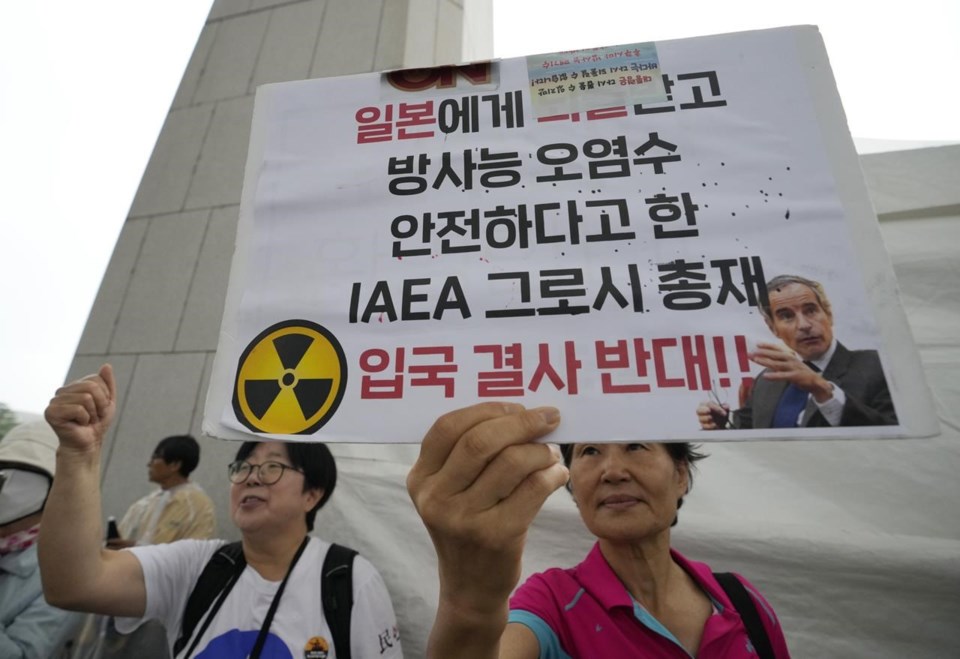SEOUL, South Korea (AP) ã South Korean opposition lawmakers sharply criticized the head of the United Nations' nuclear watchdog for its approval of Japanese plans to release treated wastewater from the damaged Fukushima nuclear power plant during a tense meeting in Seoul on Sunday, with protesters screaming outside the door.
Rafael Mariano Grossi, the International Atomic Energy Agencyãs director general, arrived in South Korea over the weekend to engage with government officials and critics and help reduce public concerns about food safety. The planned release of the Fukushima plant's treated wastewater emerged as a major political issue in South Korea after the IAEA last week approved the Japanese discharge plans, saying the process would meet international safety standards and pose negligible environmental and health impacts.
South Koreaãs government has also endorsed the safety of the Japanese plans, saying that the contamination levels of water pumped out from the plant would be within acceptable standards and wouldnãt meaningfully affect South Korean seas as long as the plantãs treatment systems work as designed.
In his meeting with visiting members of the liberal Democratic Party, which controls a majority in South Korea's parliament, Grossi said the IAEAãs review of the Japanese plans was based on ãtransparentã and ãscientific" research. He acknowledged concerns over how the Japanese plans would play out in actuality and said the IAEA would establish a permanent office in Fukushima to closely monitor how the discharge process is implemented over the next three decades.
The lawmakers responded by harshly criticizing IAEAãs review, which they say neglected long-term environmental and health impacts of the wastewater release and threatens to set a bad precedent that may encourage other countries to dispose nuclear waste into sea. They called for Japan to scrap the discharge plans and work with neighboring countries to find safer ways to handle the wastewater, including a possible pursuit of long-term storage on land.
The party has also criticized the government of South Korean President Yoon Suk Yeol for putting people's health at risk while trying to improve relations with Japan.
ãIf you think (the treated wastewater) is safe, I wonder whether you would be willing to suggest the Japanese government use that water for drinking or for industrial and agricultural purposes, rather than dumping it in the sea,ã Woo Won-shik, a Democratic Party lawmaker who attended the meeting, told Grossi. The party said Woo has been on a hunger strike for the past 14 days to protest the Japanese discharge plans.
Further details from the meeting werenãt immediately available after reporters were asked to leave following opening statements. Dozens of protesters shouted in a nearby hall while holding signs denouncing the IAEA and Japan, and they were closely watched by parliamentary security staff.
Hundreds of demonstrators had also marched in downtown Seoul on Saturday demanding that Japan scrap its discharge plans. Those protests provided a tense backdrop to a meeting between Grossi and South Korean Foreign Minister Park Jin, who called for IAEAãs ãactive cooperationã in reassuring the South Korean public.
The safety of Fukushimaãs wastewater has been a sensitive issue for years between the U.S. allies. South Korea and Japan have been working in recent months to over wartime historical grievances to address shared concerns such as the North Korean nuclear threat and Chinaãs assertive foreign policy.
South Koreaãs assessment about the safety of the discharge plan was partially based on observations by a team of government scientists who were allowed to tour the Fukushima plant in May. Japanese Prime Minister Fumio Kishida had agreed to that visit during a May 7 summit with Yoon in Seoul, in a show of his desire for improved ties.
In a statement released by state media on Sunday, North Korea also criticized the Japanese discharge plans, warning against ãfatal adverse impact on the human lives and security and ecological environmentã resulting from the discharge of ãnuclear-polluted water.ã The statement, which was attributed to an unidentified official in North Koreaãs Ministry of Land and Environment Protection, also criticized Washington and Seoul for backing the Japanese plans.
ãWhat matters is the unreasonable behavior of IAEA actively patronizing and facilitating Japanãs projected discharge of nuclear-polluted water, which is unimaginable,ã it said. ãWorse still, the U.S. and (South) Korea openly express unseemly ãwelcomeã to Japanãs discharge plan that deserves condemnation and rejection, provoking strong anger of the public.ã
A massive earthquake and tsunami in 2011 destroyed the Fukushima plantãs cooling systems, causing three reactors to melt and release large amounts of radiation.
Tokyo Electric Power Company Holdings, which operates the facility, has been storing the treated water in hundreds of tanks that now cover most of the plant and are nearly full. Japanese officials say the tanks must be removed to make room to build facilities for the plantãs decommissioning and to minimize the risk of leaks in case of another major disaster. The tanks are expected to reach their capacity of 1.37 million tons in early 2024.
Japan first announced plans to discharge the treated water into the sea in 2018, saying the water will be further diluted by seawater before being released in a carefully controlled process that will take decades to complete.
Kim Tong-hyung, The Associated Press



